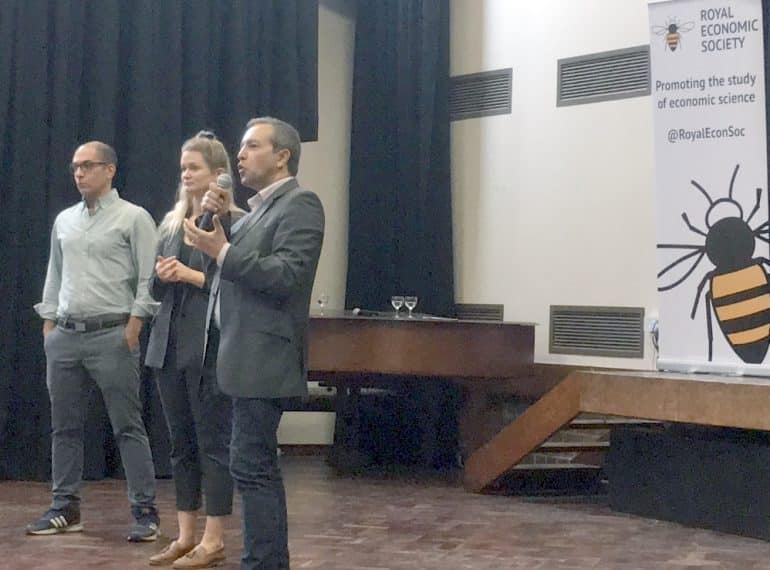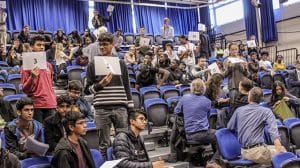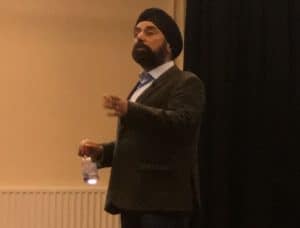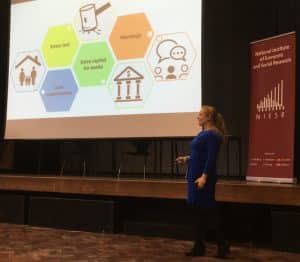Much to their profit: boys end up in the black while learning from policy-makers at top-flight Economics conference

A team of five Year 12 QE economists was the only one to turn a profit in an auction at a prestigious conference attended by over 200 delegates from a number of leading schools.
 More than 30 QE boys attended the Economics Conference at Woodhouse College in North Finchley, which aimed to offer pupils a unique opportunity to hear directly from academics, researchers and policymakers.
More than 30 QE boys attended the Economics Conference at Woodhouse College in North Finchley, which aimed to offer pupils a unique opportunity to hear directly from academics, researchers and policymakers.
The event was jointly organised by the college and the National Institute of Economic and Social Research (NIESR); it was supported by supported by blue-chip organisations including The Bank of England, The Royal Economics Society, The Government Economics Service and several top universities.
QE’s Head of Economics Shamendra Uduwawala said: “This type of event not only allows our boys to hear directly from both leading academics and those who shape policy, but it also enables them to mix with their peers from other schools. There is no doubt that a conference such as this exposes boys to high-level thinking while reinforcing what they have been learning in the classroom.”
 Professor Jagjit Chadha, the Director of NIESR and a Fellow of Clare College, Cambridge, delivered a truncated version of his recent Brexit talk to the Commons Select Committee on Brexit.
Professor Jagjit Chadha, the Director of NIESR and a Fellow of Clare College, Cambridge, delivered a truncated version of his recent Brexit talk to the Commons Select Committee on Brexit.
QE pupil Rishi Shah, one of the joint Presidents of the School’s Economics Society said: “For me, this talk was the highlight of the day; it was about forecasting and the role it plays in predicting the outcomes of Brexit. Professor Chadha used the metaphor of rolling a dice to show how forecasts can be rational, accurate yet wrong. He gave an insight into the work that NIESR conducts in forecasting and mapping out the likely outcomes of Brexit and the rationale behind the effects of business uncertainty.”
In her lecture, Financial Stability: a fine balancing act, Dr Rhiannon Sowerbutts described her role at the Bank of England as a Senior Economist and advisor to the Financial Policy Committee.  She spoke about the importance of identifying potential risks to financial stability, such as household debt rising faster than incomes.
She spoke about the importance of identifying potential risks to financial stability, such as household debt rising faster than incomes.
Dr Babak Somekh, from the University of Bristol. led an auction activity in the afternoon, involving food items. The delegates were split into teams of five. Year 12 pupil Hanif Gofur, who is the other joint President of QE’s Economics Society said: “We didn’t know in advance which food item would be auctioned next, so all the teams were kept on their toes. The atmosphere became electrified and chaotic as bids between schools intensified – often beyond the bounds of rationality.” Hanif and his QE teammates held their nerve and turned a healthy £250 profit on their £2,500 budget – the only team to make a profit.
Sarah Billingham, an Assistant Economist at the Department for Business, Energy and Industrial Strategy, promoted a new Degree Apprenticeship offered by the Government Economics Service in her lecture, How can economists influence policy? She suggested to delegates that this programme could be a good option for aspiring economists aiming for a higher education qualification who wished to avoid student debt and the loss of three to four years of potential earnings.
The day was concluded by Dr Lea Samek, of Kings College London, and Dr Michela Vecchi, of the University of Middlesex, who respectively looked at the UK’s productivity performance since the financial crash of 2008 and the impact of automation on the UK labour market.
Rishi said: “Overall, it was a phenomenal experience to hear from many different renowned speakers and it most definitely piqued my interest in Economics.”
In addition to delegates from QE and the hosts, Woodhouse College, there were pupils from Dame Alice Owen’s School, Highgate Wood School, The Camden School for Girls and Fortismere.
